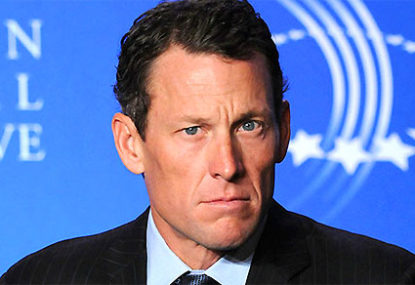'I've just won a stage of the Tour de France, mate!': Hindley grabs yellow jersey as Aussie blows Tour apart
Australia's Jai Hindley has said he is "lost for words" after a shock stage victory at the Tour de France earned him the leader's…

Six months is a long time. You could run eight Tours de France in that time, if you tried hard enough.
A hell of a lot happens in half a year, so to be banned from cycling for six months must be incredibly tough mentally – as well as the obvious physical repercussions.
However, compare six months to a lifetime and it feels like a drop in the ocean. Lance Armstrong was banned from competitive cycling for life in September 2012 after USADA released its dossier detailing US Postal’s systematic doping program.
On the other hand, his teammates who testified – George Hincapie, Christian Vande Velde and Tom Danielson – were banned for six months.
Now, each rider charged was guilty of the same offence, doping to gain an advantage in cycling’s biggest races, but one man was guilty of what is in cycling now a far more heinous crime – being Lance Armstrong.
Armstrong was banned for life for far more than just doping. The seven Tour de France wins aren’t even the main reason why there was a lifetime ban slapped on him.
The reason why Lance Armstrong was banned for life was his relentless and merciless counterattacks on anyone who dared speak out against him. He sued the Sunday Times and David Walsh, he threatened legal action against Emma O’Reilly, he attacked Betsy and Frankie and Andreu, and he intimidated Tyler Hamilton and Floyd Landis.
These are to name but a few of his acts during his years trying to cling on to his titles, and so it was with very little regret that we cast Armstrong off to the legal wolves with his ban in 2012.
Now though the Armstrong news machine has churned back into action as he conducted an interview for the BBC on the weekend. Pointing out that if he went back to 1995 he would dope again, he has stirred up the cycling world who had been trying its best to forget about the intense Texan.
He also stated he believed the Tours de France between 1999 and 2005 should have a winner. Armstrong didn’t specify who but it’s pretty clear who his first choice would be.
His comparison of the block of his now winner-less Tours to the blocks left by the first and second world wars raised a few eyebrows, but it raised a question, who, if anyone should be declared winner of those races?
A popular view among journalists is to leave them blank to signify the amount of cheating going on in the peloton, but that rings rather hollow when a vast bulk of the Tour winners cheated to get where they are in history today.
Should we find the first clean rider to finish and award him the title, even if he finishes in last place?
It does seem rather strange to have Armstrong banned for life when we have Alexander Vinokourov and Bjarne Riis managing teams in the top tier of professional cycling. The duo are both Grand Tour winners, and proven dopers.
Jonathan Vaughters, an ex-teammate of Armstrong also remains in the sport, although with a very different attitude to Riis and Vinokourov.
Double standard runs thick through cycling when it comes to doping, and a clear decision needs to be made on the issue. UCI President Brian Cookson has invited Armstrong to a truth and reconciliation hearing more than once, making his position clear on Armstrong’s place in the sport – that he believes he has one.
It will be a tough sell if Cookson attempts to bring Armstrong back into the sport in any capacity, with many believing his bullying and intimidation make his case different to anyone else in the sport.
However, the issue as to whether Armstrong will be allowed a place in the sport again has gone on too long. Brian Cookson must now decide on the Armstrong issue, once and for all.